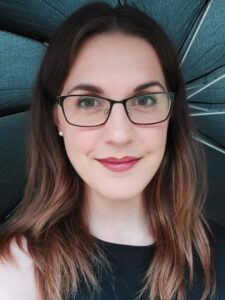
Psychedelic Speaker Series
“A Specific Cure for Homosexuality: Postwar Psychedelic Conversion Therapies in the United States and Canada”
Speaker:
Andrea Ens
Purdue University
The past decade’s psychedelic renaissance has brought with it increased interest in the history of psychedelic therapies in all their variable forms, including their messy historical legacy for LGBTQ2S+ communities. From the end of World War II to the early 1970s, for instance, various North American scientists, cultural commentators, and laymen expressed concerns regarding psychedelics’ possible relationships to shifting sexual and gender norms. Some, like American college psychiatrist Preston K. Munter, feared psychedelics might trigger unwanted same-gender desires in young heterosexual consumers. But other psychedelic practitioners in this period stressed their supposed potential to strengthen or even create heterosexual desires, as exemplified by Timothy Leary’s claim that “LSD is a specific cure for homosexuality” in a 1966 interview with Playboy magazine. Leary’s statement alludes to psychedelics’ historical applications in conversion therapy: a term referring to medicalized practices aiming to eliminate same-gender sexual desires and actions. Conversion therapies are now illegal in many parts of the world and have since been denounced by many professional mental health organizations as harmful, unethical, and ineffective.
This presentation thus outlines Canadian and American practitioners’ use of LSD, mescaline, and peyote in psychedelic conversion therapies during the postwar period. Such programs in both countries drew from widespread psychiatric faith in psychoanalysis and pharmacology in changing patient behavior, as well as shared Cold War-era cultural anxieties about sex, gender, and national security that negatively associated same-gender attraction with Communism, criminality, and psychopathy. This history reminds us of psychedelics’ potential both for healing and for harm depending on therapeutic intent. Though postwar psychedelic conversion therapists argued “curing” same-gender attraction would benefit individual patients and society at large, they exploited queer patients’ affective needs for love, safety, and acceptance in ways transforming drugs popularly associated with sexual liberation into tools supporting anti-gay social narratives.
Sponsors for this event include the Holtz Center, the UW Center for Transdisciplinary Research in Psychoactive Substances, the American Institute of the History of Pharmacy, and George Urdang Chair in Pharmacy History.
Attendees must register to attend this virtual presentation.
 Andrea Ens (she/her/hers) is a doctoral candidate in Purdue University’s History Department. Her primary research interests involve the history of medicine, sexuality, and psychopharmacology in twentieth-century Canada and the United States. Andrea completed her MA in History at the University of Saskatchewan in 2019 with a thesis examining the subjective experiences of twelve same-gender attracted men who received LSD therapy on the basis of their sexual orientation at Hollywood Hospital between 1955 and 1973. Her current dissertation research analyzes the lived experience of conversion therapy in North America between 1952 and 2013, seeking to understand how such practices have historically used queer patients’ affective needs for acceptance, love, safety, and validation in ways advancing anti-gay and anti-trans social narratives. This presentation is based on research for the second chapter of her dissertation, which examines the history of psychedelic conversion therapy in North America.
Andrea Ens (she/her/hers) is a doctoral candidate in Purdue University’s History Department. Her primary research interests involve the history of medicine, sexuality, and psychopharmacology in twentieth-century Canada and the United States. Andrea completed her MA in History at the University of Saskatchewan in 2019 with a thesis examining the subjective experiences of twelve same-gender attracted men who received LSD therapy on the basis of their sexual orientation at Hollywood Hospital between 1955 and 1973. Her current dissertation research analyzes the lived experience of conversion therapy in North America between 1952 and 2013, seeking to understand how such practices have historically used queer patients’ affective needs for acceptance, love, safety, and validation in ways advancing anti-gay and anti-trans social narratives. This presentation is based on research for the second chapter of her dissertation, which examines the history of psychedelic conversion therapy in North America.




